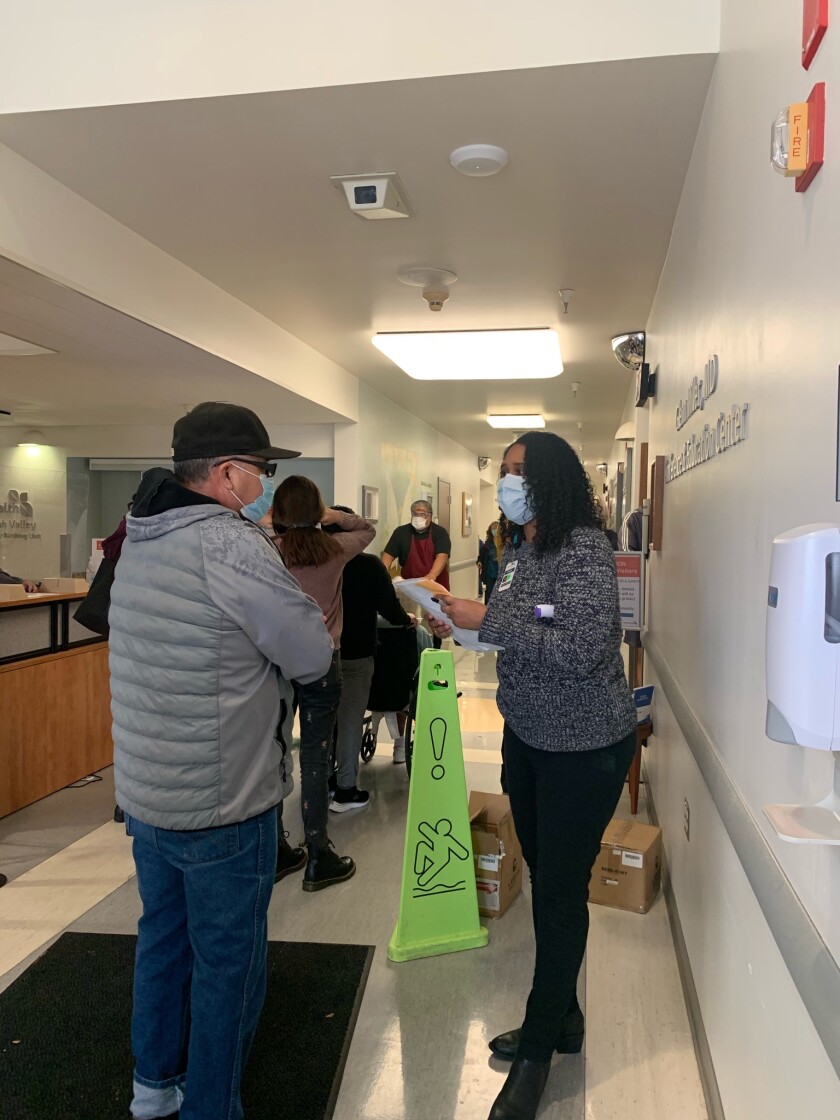SACRAMENTO —
About the time Gov. Newsom took to Facebook on Monday to lament the pace of vaccine distribution statewide, one Northern California hospital was injecting local residents at a furious pace — providing an unintentional roadmap for how a mass inoculation program could work.
At 11:35 on Monday morning, senior staff at Adventist Health Ukiah Valley Medical Center in Mendocino County were holding their first 2021 executive meeting when the hospital pharmacist interrupted: The compressor on a freezer storing 830 doses of the Moderna COVID-19 vaccine had stopped working hours earlier, and the alarm meant to guard against such failure had failed.
The doses were quickly thawing.
The Moderna vaccine is shipped and stored at frozen temperatures, and stays stable up to 8 degrees Celsius in a regular refrigerator for up to 30 days. But once it reaches room temperature, as it did in the Adventist freezer, it must be used within 12 hours. By the time the freezer problem was discovered, the vials had been creeping towards warm for some time.
Medical staff estimated they had two hours to use them before they would no longer be viable.
“It was not how my day was planned,” said Adventist spokeswoman Cici Winiger, who was in the executive meeting. “At that point it was all hands on deck, drop everything.”
With the minutes ticking down, the medical team made the decision that the goal would be to inject every dose, regardless of state guidelines. The medical team felt that “the more people we vaccinate just brings us closer to herd immunity,” said Winiger.

Winiger got on the phone, trying to give the shots first to those on the priority lists. One local elder care facility took 40 doses for staff and the hospital’s chief medical officer drove them to the facility himself.
About 200 doses belong to the county, and were being stored by the hospital. Winiger said those doses were returned to the county.
Lt. John Bednar, who helps run the county jail, said his facility received 97 of those doses at about 1 p.m. The jail has been experiencing an outbreak, with about three dozen inmates out of 250 currently positive, he said. About a dozen staff have also fallen ill with the virus.
Faced with only an hour to use the shots, sheriff’s officials decided to administer them to staff and front-line personnel because they didn’t think there was enough time to gain consent and organize a safe protocol for inmates. Four county medical staff began giving the shots, said Bednar.
“I was like, ‘Oh, boy, let’s get going,” said Bednar, when the shots first arrived. “I think it went as well as it could.”
Bednar was one of those who received the initial dose, though he isn’t yet sure how he feels about it.
“I don’t know. It’s one of those things where I was a little hesitant at first because it’s a new vaccine,” he said. “But I have family that is older and it’s better that I get it than possibly risk their safety.”
Even as the shots were being delivered to the jail, a big-rig accident on one of the main highways cut the hospital off from its sister facility about 20 minutes away, said Winiger, making it impossible to reach. Ukiah, a town of about 20,000 surrounded by state and national forest, has a population spread through its rural and often difficult-to-navigate territory, creating a daunting challenge to quickly deliver the doses to remote areas.
The Adventist staff turned instead to the local community, with about 600 shots remaining.
First, they sent a text asking every available medical professional to turn out at one of four sites to give the vaccines and monitor those who took them.
“We had nurses, pharmacists, physicians, even those that are not part of the hospital, coming to help,” said Judson Howe, president for Adventist Health in Mendocino County. “It was all hands on deck and a true community effort.”
Then hospital staff blasted out a text to employees letting people know that anyone who showed up could have the shot.
“We just told them ‘Tell everyone you know,’” said Winiger. “We just wanted to make sure none of this goes to waste.”
By noon, within 15 minutes after learning of the freezer failure, shots were being administered at all four sites. Lines began to form as word spread and some staff was siphoned off for crowd control, which Winiger said was “insane.”
At the site Winiger ran, about 30 people were turned away after the doses ran out. At the main site near the hospital, she estimates about 120 people left without the shot.
But by the two-hour deadline, every dose had found a patient, said Winiger.
And though a debrief late in the afternoon found items that could have gone more smoothly — better communication, quicker gathering of supplies — other aspects were “heroic,” she said. Dozens of medical staff turned out to volunteer, and the quick decision to split into four clinics kept crowds at controllable numbers.
It could take some time to know the effectiveness of Monday’s mass inoculations. But the impromptu effort, Winiger said, may prove to be a lesson on how the state could administer more vaccines quickly and efficiently.
Hopefully in less stressful circumstances.
“It’s just amazing to go toward one goal and get it done,” Winiger said. “I was just thinking in my head, can you imagine if we had more time to do this? If this is how we do a massive vaccination later, we are golden. We can do this.”
"Give" - Google News
January 05, 2021 at 10:46AM
https://ift.tt/2Mz5wM5
Hospital lost freezer, gave out 600 vaccine shots in 2 hours - Los Angeles Times
"Give" - Google News
https://ift.tt/2YqGX80
https://ift.tt/2YquBwx
Bagikan Berita Ini














0 Response to "Hospital lost freezer, gave out 600 vaccine shots in 2 hours - Los Angeles Times"
Post a Comment